Gill James's Blog, page 2
November 22, 2020
Talking to another of our Best of CafeLit 9 contributors, Allison Symes.
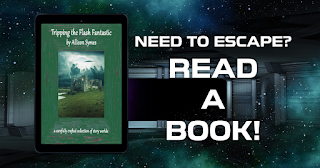
What made you decide to write for CafeLit?
Now this is a toughie! That’s mainly because I’ve written for CafeLit for a long time and frankly can’t remember though I suspect being published by Bridge House Publishing was my way to discovering the existence of the wonderful CafeLit! =I do recall being delighted to have found a website where quirky fiction was welcomed (and indeed encouraged). I love reading and writing quirky fiction (which I often call “fairytales with bite”) so trying to write for CafeLit was clearly the thing for me to do!
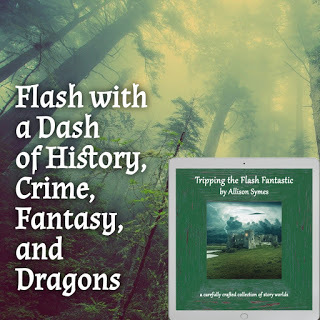
How did you pick the drink to go with your story?
I always find this bit more difficult to do than writing and editing the story! What I usually do is go by the mood of the story. If it is a light, humorous one, then I’ll pick a frothy type of drink. If the mood is darker, as it is with my flash piece,
Flash or short story. Why this form for your contributions this time?
Well, I must confess to having a foot in both camps here for Cafelit 9. My flash tale, Humourless, is a dark story and I felt it worked best by keeping it short. My other contribution is Green Door which is a longer short story but for my character, Emily, and the major changes to her life, the tale needed to be beyond the flash fiction upper limit. In both cases (and indeed for all of my writing), what suits the need of the character tells me what kind of story it is going to be. I think character first, word count very much second. If I know I’m going to be writing to a specific word count, then that tells me what kind of story it has to be - one that focuses on one moment of change for a character.
What makes a good story for CafeLit?
One that is different, quirky, and perks a reader up as they drink their tea/coffee etc. You want the story to make the reader feel as if they were glad to have read that story and they cared about what happened to your characters. Has to be an enjoyable experience!
What’s your latest writing news?
I’m delighted to say my second flash fiction collection, Tripping the Flash Fantastic, came out in September 2020 (Chapeltown Books). Some of my stories start life on CafeLit but I always write new material for the collections to go with these. You can find both of my flash collections and the anthologies where I’ve had short stories published at http://author.to/AllisonSymesAuthorCent
I am pleased to say I now have a Youtube channel where I post my book trailers and, every so often, put up story videos I’ve created. It’s a good place to go if you want to see what flash fiction is all about. See https://www.youtube.com/channel/UCPCiePD4p_vWp4bz2d80SJA for more.
By the time this goes out, I will have been at my first book festival as an author. I went to the online Brechin/Angus Book Festival on 21st and 22nd November 2020. I also took part in a Zoom event with you, Gill, and Dawn Knox back in September and it was great using a Powerpoint presentation as part of that. All good experience!
This year has been a strange one for everyone but to a certain extent it has made me more creative in my thinking. As events had to go online, I had to learn to make videos (which led to me setting up my own Youtube channel. I've also been a guest on Wendy H Jones's The Writing and Marketing Show talking about flash fiction. I've also been interviewed for Chat and Spin Radio twice too. So an interesting year but not the one I, or anyone else, would have anticipated I think!
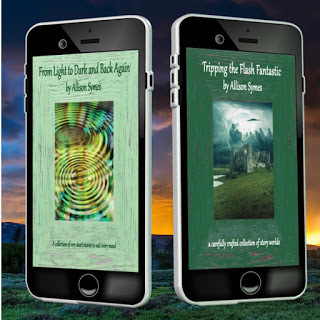
Talking to another of our Best of CafeLit 9 contributors.

What made you decide to write for CafeLit?
Now this is a toughie! That’s mainly because I’ve written for CafeLit for a long time and frankly can’t remember though I suspect being published by Bridge House Publishing was my way to discovering the existence of the wonderful CafeLit! =I do recall being delighted to have found a website where quirky fiction was welcomed (and indeed encouraged). I love reading and writing quirky fiction (which I often call “fairytales with bite”) so trying to write for CafeLit was clearly the thing for me to do!

How did you pick the drink to go with your story?
I always find this bit more difficult to do than writing and editing the story! What I usually do is go by the mood of the story. If it is a light, humorous one, then I’ll pick a frothy type of drink. If the mood is darker, as it is with my flash piece,
Flash or short story. Why this form for your contributions this time?
Well, I must confess to having a foot in both camps here for Cafelit 9. My flash tale, Humourless, is a dark story and I felt it worked best by keeping it short. My other contribution is Green Door which is a longer short story but for my character, Emily, and the major changes to her life, the tale needed to be beyond the flash fiction upper limit. In both cases (and indeed for all of my writing), what suits the need of the character tells me what kind of story it is going to be. I think character first, word count very much second. If I know I’m going to be writing to a specific word count, then that tells me what kind of story it has to be - one that focuses on one moment of change for a character.
What makes a good story for CafeLit?
One that is different, quirky, and perks a reader up as they drink their tea/coffee etc. You want the story to make the reader feel as if they were glad to have read that story and they cared about what happened to your characters. Has to be an enjoyable experience!
What’s your latest writing news?
I’m delighted to say my second flash fiction collection, Tripping the Flash Fantastic, came out in September 2020 (Chapeltown Books). Some of my stories start life on CafeLit but I always write new material for the collections to go with these. You can find both of my flash collections and the anthologies where I’ve had short stories published at http://author.to/AllisonSymesAuthorCent
I am pleased to say I now have a Youtube channel where I post my book trailers and, every so often, put up story videos I’ve created. It’s a good place to go if you want to see what flash fiction is all about. See https://www.youtube.com/channel/UCPCiePD4p_vWp4bz2d80SJA for more.
By the time this goes out, I will have been at my first book festival as an author. I went to the online Brechin/Angus Book Festival on 21st and 22nd November 2020. I also took part in a Zoom event with you, Gill, and Dawn Knox back in September and it was great using a Powerpoint presentation as part of that. All good experience!
This year has been a strange one for everyone but to a certain extent it has made me more creative in my thinking. As events had to go online, I had to learn to make videos (which led to me setting up my own Youtube channel. I've also been a guest on Wendy H Jones's The Writing and Marketing Show talking about flash fiction. I've also been interviewed for Chat and Spin Radio twice too. So an interesting year but not the one I, or anyone else, would have anticipated I think!

November 21, 2020
A chat with Christopher P. Mooney, whose single author collection, Whisky for Breakfast we have recently published
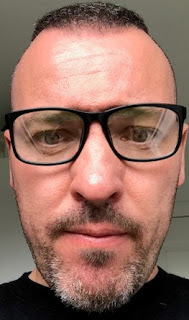
What do you write? Why this in particular?
I write mostly transgressive fiction, which is defined as a genre of literature which focuses on characters who feel confined by the norms and expectations of society and who break free of those confines in unusual or illicit ways. My characters, in other words, colour outside of society’s lines: they are hustlers, addicts, gangsters, killers, thieves; they are the lost, the lonely, the broken-hearted. Why these characters in particular? I think I’m drawn to them in my own writing and in other people’s writing because, quite simply, they are more interesting to me. And, honestly, I see something of myself reflected in some of these characters, too.
What got you started on writing in the first place?
I’ve always loved stories – any stories, in any format – and I have a love for and a fascination with words and language. I can remember writing stories as a child, at school and at home, and it was something I returned to several years ago. At the beginning of 2015, encouraged by a colleague at the time, I decided to take my writing more seriously and to pursue publication. Since then, ongoing, I’ve committed considerable time and effort to what is now my main interest: getting my own words on the page.
Do you have a particular routine?
I don’t have a writing routine, no. I have a full-time job (I teach English Language and Literature at a local secondary school) and I have three young children, so I write when I can, which, unfortunately, is not often. Certainly, it’s not often enough for me to be able to put on the page all of the ideas and stories swirling round in my head.
Do you have a dedicated working space?
I have a big dining table in the living room of the rented flat where I live, and this is where I do all of my writing.
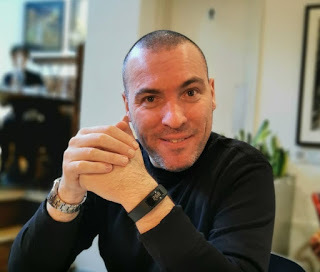
When did you decide to call yourself a writer? Do you do that in fact?
I’ve never called myself a writer. I tell people I’m a teacher – it’s my job, my career; it’s what pays the bills – whose main hobby is writing.
How supportive are your family and friends?
My family and friends are great in many ways, not only through their interest in and support of my writing. Despite my job, despite my writing, I’ll never have the words to adequately express how much love I have for all of them.
What are you most proud of in your writing?
I’m most proud of my recently-published single-author collection, Whisky for Breakfast, because it’s the culmination of years of time and effort. I see it as a huge personal achievement and I’m delighted to finally be able to hold the book in my hands.


How do you get on with editing and research?
I enjoy research and – when writing about real people and real places, even as part of pieces of work that are predominantly fictional – I try to make sure they are represented as accurately as possible.
Do you have any goals for the future?
I would like to publish a second collection of short stories and a collection of short stories written entirely in Scottish/Glaswegian vernacular. The first drafts of both of these collections are almost finished. My ultimate aim is to finish writing my historical novel, The Fifth Philosophy.
Which writers have inspired you?
I’ve always been a voracious reader – my parents read to me and my brother when we were children and there were always books in our house – and, until quite recently, I read something almost every day for about twenty years. Stephen King says ‘If you don’t have time to read, you don’t have the time – or the tools – to write.’ I think this is absolutely true (I wouldn’t dare disagree with the man!) and I’m sure I wouldn’t have been able to write anything decent without first having read, among many others, Jack Kerouac, Charles Bukowski, Ernest Hemingway and Chuck Palahniuk. And Stephen King himself, of course. I’m a huge admirer of Shakespeare, too.
Website:https://christopherpmooney.com/Twitter: ChrisPatMooney
Amazon Author Page:
Single-Author Collection (Whisky for Breakfast):
Paperback Kindle
A chat with Christopher Mooney, whose single author collection, Whisky for Breakfast we have recently published

What do you write? Why this in particular?
I write mostly transgressive fiction, which is defined as a genre of literature which focuses on characters who feel confined by the norms and expectations of society and who break free of those confines in unusual or illicit ways. My characters, in other words, colour outside of society’s lines: they are hustlers, addicts, gangsters, killers, thieves; they are the lost, the lonely, the broken-hearted. Why these characters in particular? I think I’m drawn to them in my own writing and in other people’s writing because, quite simply, they are more interesting to me. And, honestly, I see something of myself reflected in some of these characters, too.
What got you started on writing in the first place?
I’ve always loved stories – any stories, in any format – and I have a love for and a fascination with words and language. I can remember writing stories as a child, at school and at home, and it was something I returned to several years ago. At the beginning of 2015, encouraged by a colleague at the time, I decided to take my writing more seriously and to pursue publication. Since then, ongoing, I’ve committed considerable time and effort to what is now my main interest: getting my own words on the page.
Do you have a particular routine?
I don’t have a writing routine, no. I have a full-time job (I teach English Language and Literature at a local secondary school) and I have three young children, so I write when I can, which, unfortunately, is not often. Certainly, it’s not often enough for me to be able to put on the page all of the ideas and stories swirling round in my head.
Do you have a dedicated working space?
I have a big dining table in the living room of the rented flat where I live, and this is where I do all of my writing.

When did you decide to call yourself a writer? Do you do that in fact?
I’ve never called myself a writer. I tell people I’m a teacher – it’s my job, my career; it’s what pays the bills – whose main hobby is writing.
How supportive are your family and friends?
My family and friends are great in many ways, not only through their interest in and support of my writing. Despite my job, despite my writing, I’ll never have the words to adequately express how much love I have for all of them.
What are you most proud of in your writing?
I’m most proud of my recently-published single-author collection, Whisky for Breakfast, because it’s the culmination of years of time and effort. I see it as a huge personal achievement and I’m delighted to finally be able to hold the book in my hands.


How do you get on with editing and research?
I enjoy research and – when writing about real people and real places, even as part of pieces of work that are predominantly fictional – I try to make sure they are represented as accurately as possible.
Do you have any goals for the future?
I would like to publish a second collection of short stories and a collection of short stories written entirely in Scottish/Glaswegian vernacular. The first drafts of both of these collections are almost finished. My ultimate aim is to finish writing my historical novel, The Fifth Philosophy.
Which writers have inspired you?
I’ve always been a voracious reader – my parents read to me and my brother when we were children and there were always books in our house – and, until quite recently, I read something almost every day for about twenty years. Stephen King says ‘If you don’t have time to read, you don’t have the time – or the tools – to write.’ I think this is absolutely true (I wouldn’t dare disagree with the man!) and I’m sure I wouldn’t have been able to write anything decent without first having read, among many others, Jack Kerouac, Charles Bukowski, Ernest Hemingway and Chuck Palahniuk. And Stephen King himself, of course. I’m a huge admirer of Shakespeare, too.
Website:https://christopherpmooney.com/Twitter: ChrisPatMooney
Amazon Author Page:
Single-Author Collection (Whisky for Breakfast):
Paperback Kindle
November 20, 2020
Chatting today to Paula Readman, another of the contributors to The Best of CafeLit 9


So, Paula, what made you decide to write for CafeLit?
I enjoy writing for CafeLit because of the wonderful support I receive from you Gill and other authors and writers. Before Covid19 going to London and meeting up for the book launch was a highlight in a long writing year.
How do you pick the drinks to go with your stories?
Normally when choosing a drink I think about when and where the story would be read, also what the theme of the story is.i.e. No Laughing Matter my flash fiction in this collection is a vampire story so the drink I chose was a Bloody Mary.
Flash or Short Story. Why this form for your contribution/s this time
I enjoy writing both. No Laughing Matter was a piece of flash fiction. Rear View Mirror, a longer piece of fiction in this collection is a statement piece. I wanted to highlight the fact men can find themselves in terrible situation with nowhere to turn. It’s made harder for them because men are supposed to be stronger sex.
What makes a good story for CafeLit?
A story with a beating heart and a clear message whether that is something to make you laugh, cry or just think. It can be of any genre, romance, crime, sci-fi etc. of any setting.
Fantastic definition: "A story with a beating heart".
What’s your latest writing news?
My crime novel Stone Angels, crime novella The Funeral Birds and single collection Days Pass like A Shadow are all ticking over in sales. Marketing is difficult as you can never be sure whether what you are doing is the right thing, so I’m busy trying different things to improve my sales. I’m busy editing a novel, writing new stories and planning a third novel.
You can find Paula's author page here.
Paula also mentioned out annual celebration which this year we're hosting via Zoom. It's on 5 December. If you'd like to join us you can register here.
November 19, 2020
Talking to Ray Daley about Cafelit


The Best of CafeLit 9 is now out and in celebration of this I'm interviewing a few of the contributors. First up is Ray Daley. Check out his superb contribution here that is the most read story on CafeLit.
Two Tickets To The End Of The World (Unused) What made you decide to write for CafeLit?I'll be honest, when I subbed, I wasn't in a good place as far as my mental health was going. Things were low and dark. I hadn't made a sale or had an acceptance for a long while so I subbed to CafeLit. It's been a lot better since then, I'm glad to say!How did you pick the drink to go with your story?I don't honestly recall being given a choice? If I was, I probably would have picked raspberry milkshake.
Well, it says ice cream shake, so not far off, I suppose.
Flash or short story. Why this form for your contribution / s this time?Flash. Again, I'll be honest. You weren't a paying market so I needed something crazy short I could easily write off and not feel too hard a loss for it.And now you're in The Best of so you'll be earning some royalties.
What makes a good story for CafeLit, would you say?Something odd or surreal, one which catches the imagination and takes you along for the ride.A very good definition. Your story certainly does that.
What’s your latest writing news? I've just signed a contract for my 1st solo pro-rates sale (to Daily Science Fiction) and I am 78 days into a challenge to sub a story every day to a paying market for a year! I'll be pitching my novel in December, and I'll be volunteering to help people with pitch crits for #PitMad. 2020 may have been terrible for the world at large but this has been my best year for acceptances & publications with not just one but two pro sales this year (so far). I've got another of my Submission Challenges coming up in January, if people want to take part, tweet me @RayDaleyWriter Amazing.
November 16, 2020
Permission to Write

You have permission to call yourself a writer as soon as you start to take yourself seriously as a writer. This may be when you’ve written a substantial amount and / or established a writing routine and / or acquired a writing space. Or become published.
When I eventually acquired my own writing room I used to leave the door a little ajar if it was okay to disturb me. It was firmly closed if it was not. Now that it’s just my OH and me it’s simpler; if I’m in my room I’m writing. Some interruptions are justified, others aren’t. He knows the score. These days if the door is shut it means I’m on a Zoom call.
Another friend had a similar routine. She lived in the countryside where people rarely locked doors and you didn’t so much knock as call out “It’s only me” as they walked in through the back door. She used to shut the porch door if she didn’t want to be disturbed.
So giving yourself time for writing and calling yourself a writer is reasonably clear cut.
But at which point do you allow yourself to call it your day job?
I slipped into the academic world almost accidentally. I started writing seriously and then discovered the Writers Register, run by the Continuing Education department of the University of Southampton. I met people who pointed me to the annual writers’ conference, run at Winchester University. There they were advertising a MA in Writing for Children. Fantastic. A few years after I got my MA I started doing a PhD in Creative and Critical Writing. As that came to an end I realised how much I enjoyed the academic life and got myself a job as a university lecturer.
I worked at the University of Salford from 2007 to 2016, part of the time as programme leader for three programmes and as senior lecturer. I have still have an email account with them and still do a few hours’ work each year. I was employed as a lecturer in creative writing - and research meant writing and writing about writing. I even had a sabbatical that enabled me to complete a novel and do research that fed into four others. There are another two planned. And get this: no one would bat an eye-lid if I spent a couple of hours working on my novel, on my work computer, in my office on the campus. “Work” might also involve a visit to the Holocaust centre near Nottingham or the Wiener Library in London.
Already the MA and the PhD not only gave me permission to spend time writing but actually demanded it. Rigour imposed deadlines. I’d paid quite a bit for this so it had belter jolly well work. The two frameworks also gave me permission to concentrate on the quality of the writing itself and not worry about whether it was commercial or not. Yes, I certainly had to recognise the commercial market especially in my teaching, but I could work beyond it.
Someone asked me recently what my ambition in writing was. Sure, I‘d like the three book deal, a six figure advance and the fame and glory that went with that. Maybe I’d treat myself to a book- shaped swimming pool.
But would I really want that? It seems to me that once that happens you no longer have the time to write. You become busy in events and meetings.
My writing has been endorsed: by the MA, the PhD and a respectable number of publications. However the writing itself hasn’t produced a living wage. The years as a senior lecture were well paid and have contributed to a decent pension. That coupled with a pension from an early teaching career, the state pension and some extra bits and pieces I’d saved, a continued drip-feed earnings from writing , make for a reasonable income. I have what I want.
So, I have permission to spend my time writing. I also work with other writers, attend French German and Spanish conversation groups and a philosophy group and I practise tai chi. I’ve recently taken a playwriting course and I’m also member of a theatre club where we watch plays and then discuss them. I’m also currently taking a marketing course. You have to live some life in order to be able to write.
Nevertheless, I must spend about half of what might be described as my working life on writing.
I am so glad that the universe has given me permission to write.
Image by congerdesign from Pixabay
November 11, 2020
Talking to Jesse Falzoi
Today I welcome to my blog Jesse Falzoi whose lovely literary lyrical collection of short stories, A Place to Be we are very proud to have published.
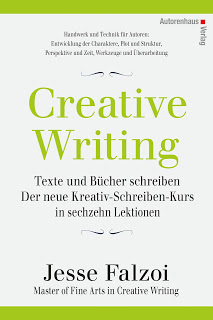
What do you write? Why this in particular?
The first thing I wrote was a novel, or what I then took for a novel because it had 200 pages. I began to write when I was pregnant with my first child, in the middle of studying, freshly separated from the future father (because he didn’t want to have children!), broke, and lonely. I first thought that I either kill myself or the baby, then I had the idea to write about a foetus that wouldn’t want to be born to a half-crazy mother. After 2 months the book was finished and I was ready for my real baby, Lilli-Brontë, now 25. This would-be novel (I didn’t know anything about form and revision then) was the first in a huge row of other would-be novels, fortunately deeply buried in my real and virtual drawers. But they were important for my journey to become a writer and that’s why I can’t throw them away, despite my fear of some dumbass wanting to publish them after my death.
I began to write short stories shortly after the birth of my child but this was also more a playing around than serious work. This began when J discovered my bible, Gotham Writers’ Workshop. I literally studied the book, did all the tasks, and many more from their wonderful website. I even went to NYC for a day-workshop, leaving Berlin on Friday afternoon after school, had my 6 hour workshop on Saturday, flew back on Sunday and was back at school on Monday morning. It was my born-again experience as a writer. Since then I studied all books on craft I could get hold on. The first story I wrote (and rewrote many times) got accepted right away. Many short stories later (and many acceptances later) I decided to ask at Bridgehouse (they’d published one of my stories) if they would publish a collection of my stories, and this now my home for A Place to Be.
Despite my first failure with novels (after 8 attempts I never wanted to write one again) Alexi Zentner, my first teacher at Sierra Nevada College, where I made my degree in Creative Writing in 2015, persuaded me to give it one last try. At first I fought it tooth and nail, I was still calling a 40 page manuscript a short story and proved it to myself in abruptly ending it. But Mike McCormack, who was my teacher a year later, said after the workshop where I had presented my short story: “I want to know what happens in Mexico.” I was devastated. I didn’t want to know. My laptop broke down, around my mouth grew a major herpes, my eldest daughter was moving out, I had other stuff to think about. Nevertheless I went to Saturn straight from the airport, bought a new laptop, sat down at my desk, wrote for 2 months, and the first draft was finished. At 3 o’clock in the morning I sent Alexi an e-mail, “It is done, I wrote that damn novel.” And he wrote back, “I am so proud of you!!!” I cried the whole night through. Even today he is still the one I inform first whenever I finish a novel.
But this isn’t a romantic love story and it doesn’t have a good ending either, even though also lots of good things happened. Since half of it took place in Mexico I fell in love with a Mexican ballet dancer with whom I share my apartment and life now. I miraculously was invited to a radio station in Mexico City and was able to promote my book on the radio show Los Contertulios, in Spanish. I have a new wonderful Mexican family. But writing the novel also made me lose a lot, not only, as it is so often said, hair and a tooth. I missed much valuable time with my then growing up first daughter, I neglected my second daughter to such a degree that she never recovered, I missed dancing, flirting, loving in my younger years. I lost friends. I was not living in the real world. I had to learn to live again. I had forgotten what it meant to have fun, to just sit around and relax. And the whole publication process drove me crazy. As usual, I translated the novel into German in order to make the last revisions, but this takes much longer with a novel than with short stories, and I was too lazy to bring the revised version back to English. Instead I submitted it to publishers here and that is why it is only published in German. But it doesn’t feel right. It lost so much. Even my daughter says that it seems translated the whole way through, translated without love. Which is true. The love was waiting for me to translate it back. In a last attempt I brought it back to English and submitted it to a Publisher in San Francisco but with corona, the project seems to be buried despite the contract I signed 2 years ago. So after all, this baby will never see the world in English and this breaks my heart too.
After that there were two other books, a memoir which I wrote in the wonderful, peaceful Heinrich-Böll-House on Achill Island, Ireland, where I had a 2-week-residency, all by myself, totally isolated except for my chats with the sheep I met on my daily walks. And another novel, which I half-heartedly submitted to a few agents and then buried in my virtual drawer. That was so far my last attempt, at least for the long form.
I also write poems. But they are just for myself. Poetry and memoir are the forms I don’t share. I need that. Writing that doesn’t have the purpose to console others for a change, purely egoistic writing. At the moment I am finishing a collection of photographs for my daughter Helena, most of which were taken in her childhood, randomly accompanied by my memories of her and her siblings, in the style of Joe Brainard’s I Remember. I cried a lot during the process. I am coming back to where I was at the beginning, more than 25 years ago. I am coming back to the joy of writing, without a purpose, without thinking of submitting, publishing, marketing. But writing isn’t important anymore. Teaching writing is important. Helping others to tell their wonderful stories. Like a midwife. At least for now.
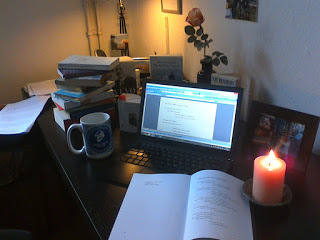
Do you have a particular routine?
Routine is everything. I write novels in daily sessions, as many hours as possible. The first draft is done very quickly, without thinking, editing, or revising. I loved NoNoWriMo; it really felt like being encouraged and protected by a large –secret – community. For a short story I also sit down straight, no more that 2 sessions (I usually write stories of in between 4000 and 6000 words). The first draft is done in trance, a bit like a drug-addict, the revision though as a cold, matter-of-factly scientist. It’s normal for me to revise a short story at least 20 times. I leave it untouched for weeks or months in between revisions so that I forget most of what happens to be able to look at it with fresh eyes.
You might wonder how I did that with my teaching job and as a single mother of three. But problems came up when they started to leave the house. It seems that I needed writing to balance my busy life as a mother. The less they needed me, the less became my urge to write. In 2016, when both of my daughters had moved out and there was only my son left, who also wasn’t that needy anymore, I had my first writer’s block. I had all these free hours but nothing felt worth writing down. Since then I hadn’t written much. A few stories, that’s it. It feels as if I have told what there was to tell. Writing for me was strongly connected with raising kids. Maybe it comes back. At the moment I keep myself busy with taking pictures, composing inspirational stuff for writers, collecting ideas. I made material for teaching creative writing, among which a padlet with 100 prompts (so far only in German, but not for long).
I’ve taken a break from writing. I needed it. Art is a cruel, jealous lover. It feels like breaking out of prison. Most probably she’ll catch me again, locking me in again, putting me again in isolation, who knows for how long. But for now I am free. It feels good.
Do you have a dedicated working space?
I can write anywhere, anytime. As a single mother of three (small) kids you learn to open your laptop anytime, no matter for how long. And type away. I even wrote on the cold floor in gyms, next to my daughter playing football.
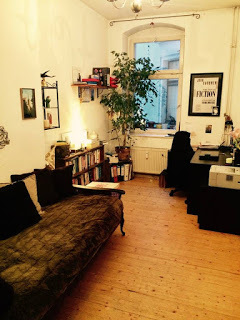
When did you decide you could call yourself a writer? Do you do that in fact?
I first called myself a writer when I’d learned how to revise and finish a story. I felt professional ever since. Here in Germany you can only call yourself a writer (officially) if you can live of your books. I tell my students to call themselves writers after the first lesson; they wrote their first story, created something out of nothing, like God; they have the right.
How supportive are your friends and family? Do they understand what you're doing?Especially my daughters have grown up with a mother sitting at a desk. They excused me on the phone, they helped out at readings, they earned their pocket money selling self-made chapbook of my stories. As grown-ups they became my first readers. Especially my eldest daughter is my strongest critic. And both daughters contributed artwork. My son wasn’t always happy; for example while taking him back home on my bike I had to stop every five minutes or so in order to write down ideas. Now he often complains that I expect too much of him; “I am not a writer”, he then says. But there was a lot of fighting with my daughters too when they were in puberty. They always thought that I contrary to other parents was expecting too much of them – like reading a book from time to time. With my eldest daughter I now share my love for books. There was one holiday where we both read at least 5 books by Tony Morrison, exchanging once we were done with one. And afterward discussing. She’s already looking forward to getting an apartment of her own with many bookshelves, for which I promised her the books I’ve already read.
At my school, I am known as The Writer. I teach Creative Writing, which is unique in my country. They all know about my published book on craft, my boss was the first one to buy five copies to distribute them among my colleagues. They are a bit jealous, I guess. My courses are very popular, even for kids who cause a lot of trouble at school. My pupils stay in contact long after the courses are done. We have a special relationship. We belong to the same tribe.
What are you most proud of in your writing?My patience and thoroughness in the rewriting and revision process.
How do you get on with editing and research?See last question. For my novel that took place in Mexico I learned Spanish and researched in length; when I finally came to Mexico City everything was exactly as I wrote it, thanks to youtube, Google, and books. If there is a chance, I get to the places I write about. It’s also tax deductible. I wrote a scene inspired by the shirt scene in The Great Gatsby, so I went to KadeWe and had a very nice afternoon with the shop assistant who let me try on every short and helped me button and unbutton it. I went to office buildings and was let in. I called at hospitals, hotels, tourist information. For my short story All the Forms of the Radiant Frost about a woman, whose baby was still born, I talked at length with a nurse at the delivery ward. I spent a day in the rain near the Polish border, waiting for the only train back to Berlin; in the end the story took place somewhere else. Research is the fun part of writing; this is when I feel professional.
Do you have any goals for the future?Get back to the point where I just loved to write.
Which writers have inspired you?Flannery O’Connor, especially with her approach to generating stories and describing the life of an artist (see her essays Mystery & Manners), James Joyce, Gustave Flaubert & Virginia Woolf for their style, Alexi Zentner & Gayle Brandeis for their support and generosity, Raymond Carver in my younger writing years, and most probably German writer Max Frisch, whose novel Homo Faber I read as a teen (30 years later, a story of mine was published in the magazine Fiction, which he founded with Donald Barthelme in NYC)
The story that really turned me into a writer though was written by Shirley Jackson; I will never forgot how I read “The Lottery” on the Berlin U-Bahn at the age of 21 – and missed my stop. I fell apart reading it, thinking, I want to be able to do that, kill people with 6 pages.
In this haunting collection, one of Jesse Falzoi’s characters imagines the word “Wuthering” means “From all directions and never the one you anticipated.” Using this definition, these are Wuthering stories, coming at life from many angles, each one full of surprise and illumination. Falzoi’s characters thrum with yearning—for connection, for meaning, for a place to be, to belong. They will find a permanent home inside your heart.
"Jesse Falzoi writes with the authority of somebody who understands that sorrow and happiness can’t exist without each other. Her characters are as smart as she is, and like all good writers, the risks she takes on the page mean big rewards for her readers. Count me as a fan. - Alexi Zentner, author of Copperhead, Touch, and The Lobster Kings
This is a gifted debut. Stories which are so light and confident in their presence we can only marvel at how deep they delve into the hearts of their characters." - Mike McCormack, author of Solar Bones
November 8, 2020
Babel and the Prophecy




Someone has just written a review of Babel, the second of my Peace Child trilogy. This was first published in 2011 and I have some distance from it now. The review made me remember some astonishing things:
· There was concern a about an aging population because medicine had become so good. People weren’t dying so in order to stop overpopulation compulsory euthanasia was introduced
· A pandemic had spread over Terrestra
· Terrestra had cut itself off from other planets
· Terrestra now had to reach out to other planets
· The protagonist’s enemy had become involved in a fascist movement
And Book 1 is called The Prophecy.
Oh well. Stories repeat themselves don’t they?
November 2, 2020
Chatting to Philip Stuckey
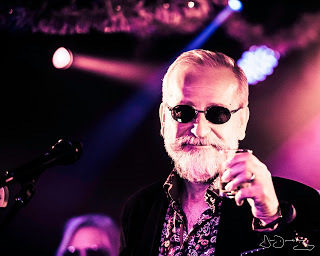
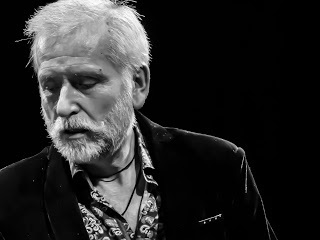
So, Philip, let's talk generally about your writing first.
What do you write? Why this in particular?
Most of my writing can be described as either philosophical fantasy or magical realism. I like to play with alternative explanations for the way the world is shaped around us. I find the thought processes stimulating but also it is a vehicle for proposing another way of being. Being a songwriter too, I have always found it useful to interpret ideas poetically so that the reader or listener can find their own selves within the words.
What got you started on writing in the first place?
Writing songs came first. I learned music in the Salvation Army and joined rock bands at school. Writing my own songs set the bands I was in apart from the lads playing Deep Purple and Black Sabbath covers. I won a song writing competition aged 17 and that gave me great encouragement.
There are a couple of names I recognize. I'm sure I'm not alone! Do you have a particular routine?
I’m pretty chaotic about writing. I scribble down notes as ideas come to me or dictate into my phone. Something I see or hear will spark an idea and I dream it through to the point I can start writing. Then it’s about grabbing a little quiet time when there aren’t too many distractions.
And do you have a dedicated working space?
I don’t but wish I did. I could easily create somewhere, because I live in beautiful surroundings. In the end I just sit down somewhere comfortable with the laptop and begin.
When did you decide you could call yourself a writer? Do you do that in fact?
Getting published gives you that right / privilege. I am fortunate in having had a number of my stories and songs published. It’s only in later life that I’ve found the head space for writing seriously though. Most of my life has been taken up with family and my business career.
How supportive are your friends and family? Do they understand what you're doing?
My family are used to me being creative and reinventing myself. I have a wonderful supportive family. Full of love.
What are you most proud of in your writing?
I am very proud to have written things that other people want to read or listen to, and take pleasure in. Amazing.
Yes, I know what you mean. How do you get on with editing and research?
I enjoy the research because I learn so much along the way. Looking into medieval witchcraft and the rabid persecution of ordinary people was fascinating. It was an interesting concept to imagine that within all the superstition and ignorance there existed a true magical line, fighting for survival. I realised very late the importance of editing. My early writing was finished when I got to the end, without even a sidewards glance at editing.I read it now and weep. I intend to rewrite so much of my early work and use the ideas again.
Do you have any goals for the future?
I have completed a YA Fantasy novel called ‘The Hunt for Moss and Magic.’ I would love to get that published and out there. I would also like to challenge myself to write something outside my comfort zone. Musically, my band Stuckfish is currently working on album 3.
Well, you do know that we have a YA imprint. I hope you will send that to us. Which writers have inspired you?
Anthony Doerr, Paulo Coelho, Tim Winton, Barbara Kingsolver, Jorge Luis Borges, Peter F Hamilton, Hilary Mantel, George R.R.Martin and as they say...many, many more...
And about your new book specifically. Tell me about Matter of Life and Death
Matters of Life & Death is a collection of short stories that reflect my personality. They are sometimes dark and sometimes light. The various themes and styles examine our emotions and attitudes and how they shape our lives and eventual demise.
I have used these stories to explore common feelings about the world in which we live, our views about the future and the situations we find ourselves in as we navigate our way through life. Hopefully there are layers within the writing for the reader to unpick. There’s magic and then there’s the magic to be found in everyday situations.
Tell us about your research for this book.
Beyond learning about the historical basis for the esoteric themes within the stories, such as alchemy and witchcraft, I also had to look deeply into my own psyche, my innermost thoughts...and my observations of the behaviours of others who I have come into contact with. I have travelled extensively for work and pleasure, sometimes off-grid or in unusual circumstances. I have seen the world from obtuse angles.
What inspired you to write this?
The need to explore what lies beneath, the alternative reasons for the way things are and of course, as with many writers, the innate desire to self analyse.
What's next?
My novel, The Hunt for Moss and Magic. It’s time for that now. Oh, and album 3 by Stuckfish.
How can we get a copy of the book?
Online at Amazon or Waterstones or by ordering though any good book shop.
Do you have any events planned?
I’m saving the events for 2021. Hopefully the world will be entering a renewed, Covid free optimism.

 Click on image to view on Amazon
Click on image to view on Amazon 




